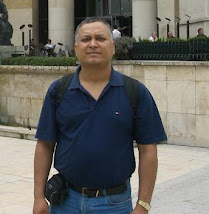-BBC news
Until now, Prachanda has rarely been seen in publicThe leader of Nepal's Maoist rebels, Pushpa Kamal Dahal, 52, is better known under his nom-de-guerre of Prachanda (Fierce One).
The former agriculture student, born in the Annapurna region of Nepal, is the undisputed leader of the Maoists, and supreme commander of their army. He has led a bloody 10-year war against the monarchy in the impoverished Himalayan nation in which more than 13,000 people have been killed. Until recently, very little was known about him. Nepalis knew Prachanda from only a couple of photographs. The rebel leader told the BBC he has three daughters and a son, who all support the Maoist movement. His wife, whom he met through the party, is also a Maoist official.
Annapurna region of Nepal, is the undisputed leader of the Maoists, and supreme commander of their army. He has led a bloody 10-year war against the monarchy in the impoverished Himalayan nation in which more than 13,000 people have been killed. Until recently, very little was known about him. Nepalis knew Prachanda from only a couple of photographs. The rebel leader told the BBC he has three daughters and a son, who all support the Maoist movement. His wife, whom he met through the party, is also a Maoist official.
'School-teacher'
In the past, Nepali journalists would from time to time interview Prachanda's widowed father, who himself had not seen his son for years. The rebel leader was
 rarely seen in public and is believed to have frequently slipped between India and Nepal, over the long, porous border.
rarely seen in public and is believed to have frequently slipped between India and Nepal, over the long, porous border.The Maoists derive their inspiration from Peru's Shining Path rebelsBut when he gave his first ever television interview, to the BBC in January, Prachanda looked more like the school teacher he once was - moustached, bespectacled and with a slight paunch. The BBC's Charles Haviland, who conducted the interview, said he came across as surprisingly mild-mannered and shy - more humorous than intimidating and without the charisma of some revolutionary leaders. All this stands in sharp contrast to the perception of him as a ruthless leader responsible for executions and terrorising swathes of Nepal's population.
His number two, Baburam Bhattarai, with a cloth cap and eagle eyes, and often seen flanking Prachanda, fits much more easily with the traditional view of what revolutionaries should look like. But in a sign that his mild-manner could well conceal a tough interior, a year ago Prachanda expelled Dr Bhattarai and his wife from the party for accusing him of being power-hungry.
It took months for him to be reinstated.
Puritanical

The Maoists participated in the country's first parliamentary elections in 1991 but their disenchantment with political squabbling and anger at the plight of the rural poor prompted them to take up arms.
Prachanda derived his inspiration from Peru's Shining Path rebels and dreamt of setting up a communist republic. He envisaged the erosion of class, caste and gender barriers.
But he has also been described as puritanical, outlawing alcohol, gambling and "vulgar literature" from India and the United States. But as talks with the government are under way there are signs that he may be willing to compromise - even perhaps on the contentious issue of accepting a role for the king of Nepal if that is the will of the people.



































No comments:
Post a Comment